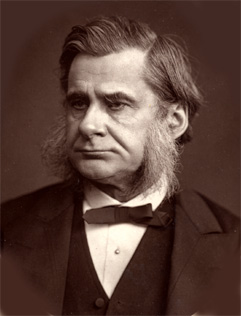I finished your book yesterday. . . Since I read Von Baer's Essays nine years ago no work on Natural History Science I have met with has made so great an impression on me & I do most heartily thank you for the great store of new views you have given me. . .
As for your doctrines I am prepared to go to the Stake if requisite. . .
I trust you will not allow yourself to be in any way disgusted or annoyed by the considerable abuse & misrepresentation which unless I greatly mistake is in store for you. . . And as to the curs which will bark and yelp -- you must recollect that some of your friends at any rate are endowed with an amount of combativeness which (though you have often & justly rebuked it) may stand you in good stead --
I am sharpening up my claws and beak in readiness
Letter of T. H. Huxley to Charles Darwin, November 23, 1859, regarding the Origin of Species

"Huxley's support for natural selection is perhaps surprising when contrasted with his earlier attacks on the evolutionary theories put forth by Lamarck and Robert Chambers. Both of these theories advocated some kind of progression -- some kind of general tendency present in all organisms to evolve "upward" into more and more complex forms. Huxley would have nothing to do with such progressionist ideas, which he regarded as being more metaphysical than scientific; this mistrust of progression lay behind his initial skepticism of all evolutionary ideas. Similarly, Huxley rejected the then-popular theory of recapitulation, following Karl von Baer (whose writings Huxley had translated from the German). Huxley wrote, "the progress of a higher animal in development is not through the forms of the lower, but through forms which are common to both lower and higher. . . "
Huxley's most famous writing, published in 1863, is Evidence on Man's Place in Nature. This book, published only five years after Darwin's Origin of Species, was a comprehensive review of what was known at the time about primate and human paleontology and ethology. More than that, it was the first attempt to apply evolution explicitly to the human race. Darwin had avoided direct mention of human evolution, stating only that "light will be thrown on the origin of Man;" Huxley explicitly presented evidence for human evolution. In this, once again, he locked horns with Richard Owen, who had claimed that the human brain contained parts that were not found in apes, and that therefore humans could not be classified with the apes nor descended from them. Huxley and his colleagues showed that the brains of apes and humans were fundamentally similar in every anatomical detail."
Thoms Huxley (1825)
assistant surgeon to HMS Rattlesnake
navy
vertebrae palaeontology
anatomist
"darwin's bulldog'
man's place in nature - man's relationship to apes
the x club
http://www.ucmp.berkeley.edu/history/thuxley.html
http://en.wikipedia.org/wiki/Thomas_Huxley
'선생, 먼저 살다' 카테고리의 다른 글
| Arthur Schopenhauer 쇼펜하우어 quotes (0) | 2011.11.26 |
|---|---|
| 조국 (0) | 2011.11.25 |
| 한 사람의 범위를 생각케 하는 사람 - 안철수 (0) | 2011.10.28 |
| Naomi Klein - 사회적 관심과 시대에 대한 이해는 아름다움을 기억하며, 나의 뉴 롤모델 (0) | 2011.09.14 |
| Shi LaBeouf 귀여운 어두움 - 어리고 아름다운 (0) | 2011.08.02 |

